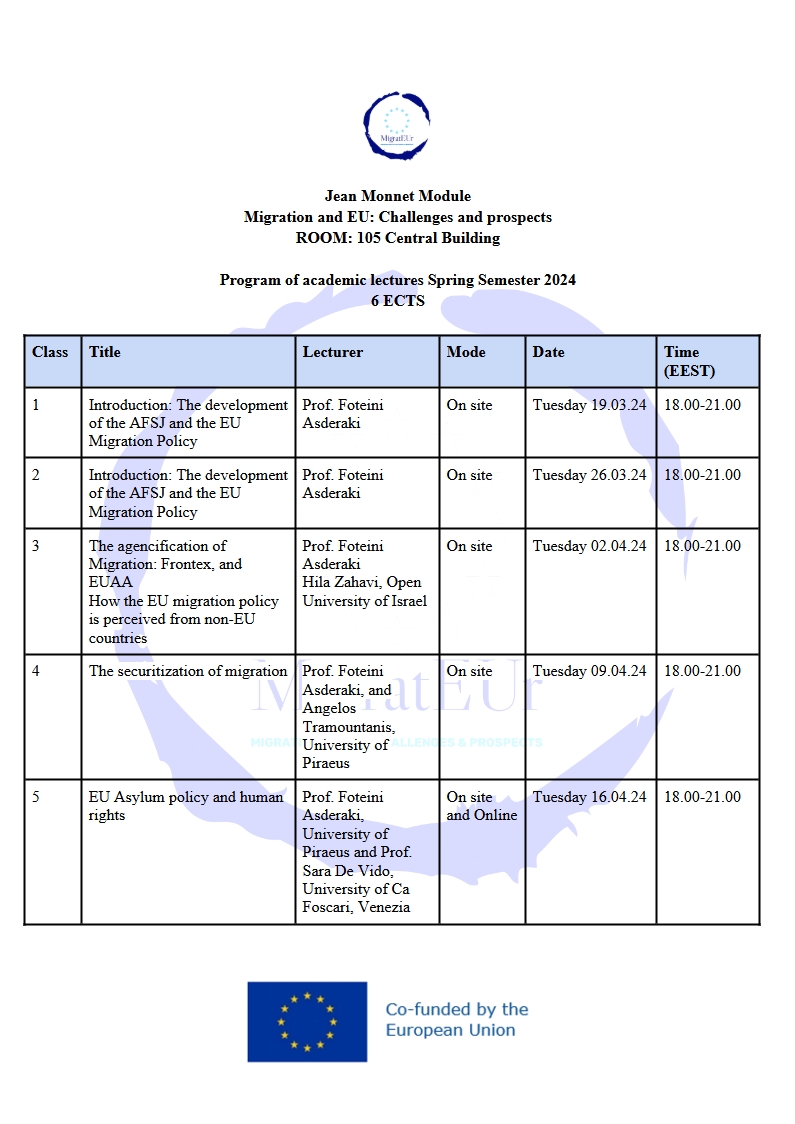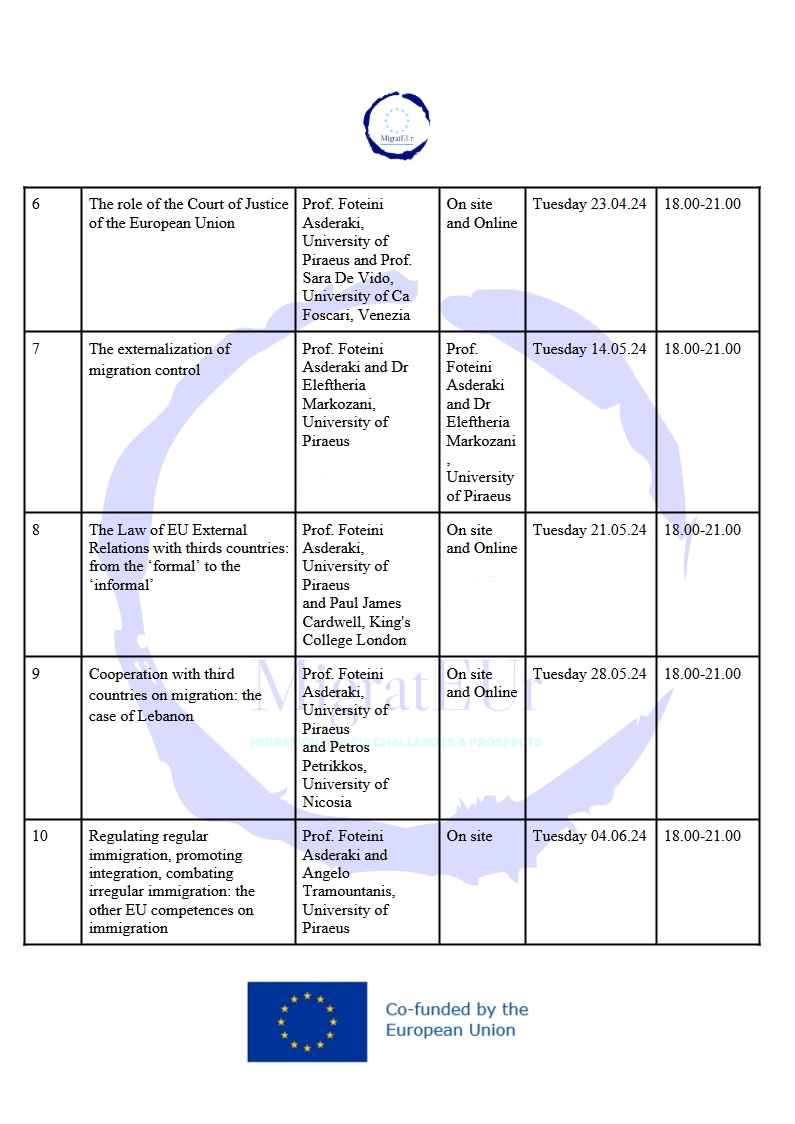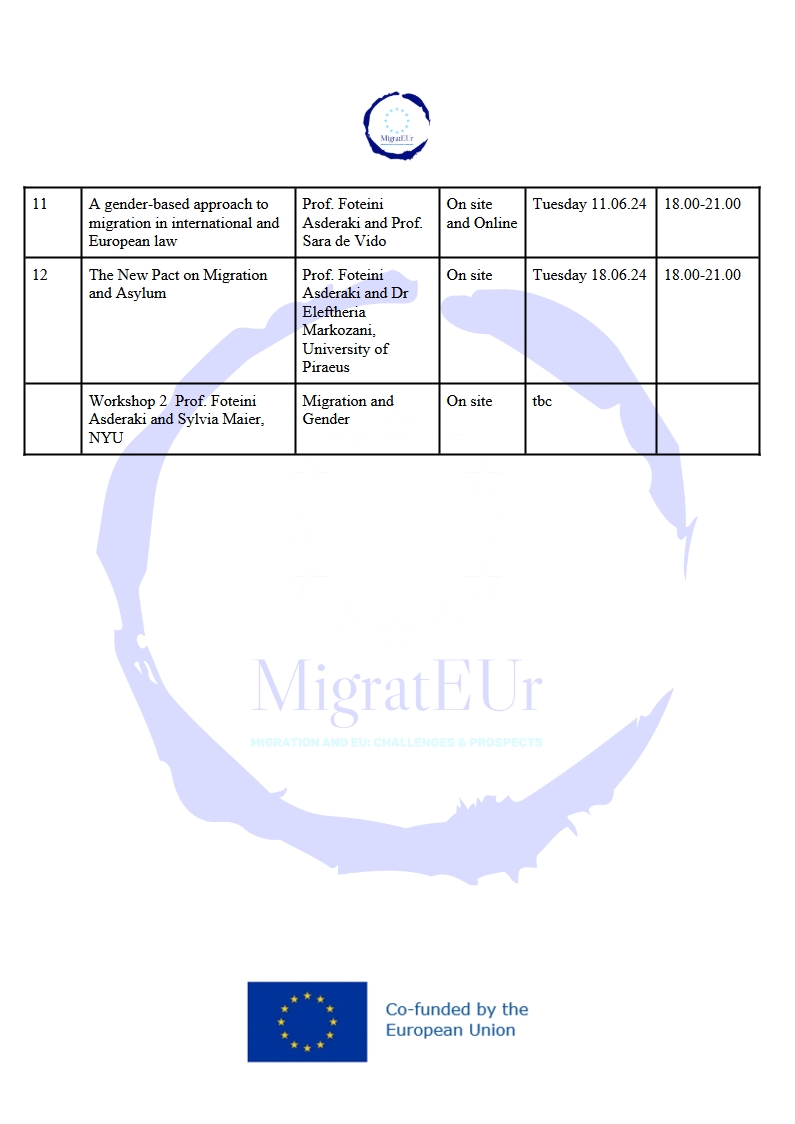Class 1: Introduction- The development of the AFSJ and the EU Migration Policy
Prof. Foteini Asderaki and Dr Eleftheria Markozani
University of Piraeus
Class Description/ objectives:
This seminar will review the gradual historical development of AFSJ policies and especially the EU migration policy since the late 1970s. It will outline and explain the decision-making process in EU migration policy based on the EU treaties, institutions and main agencies up until the 2015 Agenda on Migration.
Learning outcomes:
- understand the gradual evolution of EU migration policy
- comprehend the structure of the policy area
Suggested bibliography:
FRA, 2020, Handbook on European: law relating to asylum, borders, and immigration,
https://fra.europa.eu/en/publication/2020/
handbook-european-law-relating-asylum-borders-and-immigration-edition-2020 Niemann, A. (2012) ‘The Dynamics of EU migration policy: from Maastricht to
Lisbon’ in: Richardson, J. (ed.), Constructing a policy-making state?
Policy dynamics in the European Union, Oxford: Oxford University Press, pp. 209-233,
https://internationale.politik.uni-mainz.de/files/2013/02/Niemann-2012-EU-migration-policy.pdfGeorgia Papagianni, EU Migration Policy, In European immigration : a sourcebook, (eds)
Triandafillidou A. Gropas R., Ashgate : Aldershot, 2014,
https://cadmus.eui.eu/bitstream/handle/
1814/30557/Chapter30.pdfClass 2: EU Asylum policy and human rights
Prof. Sara De Vido
Ca’ Foscari university of Venice
Prof. Foteini Asderaki
University of Piraeus
Class Description/ objectives:
The scope of the class is to provide the international legal framework of migration and human rights, with a specific focus on non-refoulement. The class will explore legal challenges in terms of protection of human rights and will propose the analysis of some relevant cases of the European Court of Human Rights related to EU asylum policies.
Learning outcomes:
At the end of the class, students will be able to:
- to understand the importance of a human rights approach to migration
- to analyse judgments by the European Court of Human Rights on migration issues concerning the EU
Suggested bibliography:
COE, Migration and Asylum, thematic factsheet, 2021.
https://rm.coe.int/thematic-factsheet-migration-asylum-eng/1680a46f9bMarie-Bénédicte Dembour, The Migrant Case Law of the European Court of Human Rights In: Migration and the European Convention on Human Rights. Edited by: Ba?ak Çali, Ledi Bianku, and Iulia Motoc, Oxford University Press (2021).
Elina Pirjatanniemi and Maija Mustaniemi-Laakso, EU migration policy and human rights In: The European Union and Human Rights. Jan Wouters, Manfred Nowak, Anna-Luise Chané, and Nicolas Hachez, Oxford University Press (2020).
Class 3:The role of the Court of Justice of the European Union
Prof. Sara de Vido
Ca’ Foscari university of Venice
Prof. Foteini Asderaki
University of Piraeus
Class Description/ objectives:
This class will propose some reflections on the jurisprudence of the Court of Justice of the European Union on migration. Among the cases, it will cover the judgment of 14 January 2021 concerning the interpretation of the provisions of the EU Return Directive in cases involving unaccompanied children; it will reflect on some cases on migrants’ access to justice; it will discuss the preliminary rulings rendered on 1 August 2022 concerning the conduct of Italian authorities over Sea Watch vessels that had disembarked rescued persons in Italian ports in 2020.
Learning outcomes:
At the end of the class students will be able to:
- Describe the legal reasoning of the Court of Justice in some relevant migration cases
- Critically reflect on the potential of the interpretation by the Court to enhance the protection of human rights in migration.
Suggested bibliography:
M. Moraru, The European Court of Justice shaping the right to be heard for asylum seekers, returnees, and visa applicants: An exercise in judicial diplomacy, in EJLS, 2022, p. 21 ss (open access).
E. Papastavridis, Sea Watch cases before the EU Court of Justice: An analysis of International Law of the Sea, in EU Migration Law Blog, 2022.
Class 4: A gender-based approach to migration in international and European law
Prof. Sara de Vido
Ca’ Foscari university of Venice
Prof. Foteini Asderaki
University of Piraeus
Class Description/ objectives:
The purpose of the class is to highlight how international law traditionally ignored gender in migration, which has been emphasised in soft law instruments only. It will then explore chapter VII of the Council of Europe Istanbul Convention, which focuses on migration caused by violence against women. The class will also deal with the case of forced marriages as related to the EU Reunification Directive.
Learning outcomes:
At the end of the class students will be able to:
- Appreciate the importance of a gender dimension to migration
- Critically discuss issues of credibility of the woman seeking international protection
- Reflect on the protection of children from child marriages
Suggested bibliography:
S. De Vido, Against a girl’s will. Child marriages, immigration and the Directive on Family Reunification. In: Fundamental Rights and Best interests of the Child in Transnational Families, C. Ragni, E. Bergamini (eds). Cambridge University Press. 2019
S. De Vido, Escaping violence: The Istanbul Convention and Violence against women as a form of persecution. In: Migration Issues in front of international courts and tribunals. G.M Bruno et al (eds). CNR. 2019.
S. Mullally. Domestic Violence Asylum Claims and Recent Development in International human rights law: a progress narrative?, in International Comparative Law Quarterly, 2011.
Class 5: Migration, security and politics
Prof. Foteini Asderaki
Dr Eleftheria Markozani and
Angelos Tramountanis
University of Piraeus
Class Description/ objectives:
This seminar will examine the theoretical and academic discussion over the subject of the securitization of migration. Subsequently, we will analyze the actual practice of securitization in the rules and policies of EU on the management of external border controls.
Learning outcomes:
- Understand the theoretical concept of securitization
- Study the security-driven approach in the migration management
Suggested bibliography:
Markozani E. and F. Asderaki (2021), "The securitization of migration in 2015 refugee crisis: from words to actions" in The New Eastern Mediterranean, ed. A. Tziampiris and F. Asderaki, Springer Publications
Baker-Beall, C. (2019). The threat of the ‘returning foreign fighter’: The securitization of EU migration and border control policy. Security Dialogue, 50(5), 437–453.
https://doi.org/10.1177/0967010619857048Class 6: Politics, populism and migration
Petros Petrikkos, University of Nicosia
Dr Eleftheria Markozani, University of Piraeus
Prof. Foteini Asderaki, University of Piraeus
Class Description/ objectives:
This seminar focuses on the role of social movements engaging with migration across the political and ideological spectrum. It will aim at breaking down conflicting narratives across society, by addressing issues pertaining to populism, politics, civil society, and the far right. Case studies as examples will be used, though the focus is on the conceptualisation of the political link between populism and migration.
Learning outcomes:
- To understand the theoretical and practical focus and the varying approaches of social movements and civil society groups vis-a-vis migration
- To utilise case study examples in the Eastern Mediterranean and elsewhere while applying selected theoretical approaches
- To establish the political and ideological link between populism and migration
Suggested bibliography:
Chalcraft, J. (2011). Migration and Popular Protest in the Arabian Peninsula and the Gulf in the 1950s and 1960s. International Labor and Working-Class History, 79(1), 28-47.
Cuttitta, P. (2020). Non?governmental/civil society organisations and the European Union?externalisation of migration management in Tunisia and Egypt. Population, Space and Place, 26(7), e2329.
Ruzza, C. (2018) "Populism, Migration, and Xenophobia in Europe," Routledge Handbook of Global Populism, Routledge, 201-216.
Stockemer, D., Niemann, A., Unger, D., & Speyer, J. (2020). The “Refugee Crisis,” Immigration Attitudes, and Euroscepticism. International Migration Review, 54(3), 883–912.
https://doi.org/10.1177/0197918319879926Class 7: The externalization of migration control
Dr Eleftheria Markozani
Prof. Foteini Asderaki
University of Piraeus
Class Description/ objectives:
This seminar will provide an overview of the EU practices, tools and policies on external relations with third countries in migration management. It will deepen on the specific policy objectives, prospects and challenges of EU cooperation with countries of origin and transit.
Learning outcomes:
- Learn the variety of EU tools of external cooperation
- Comprehend the practices of externalisation
Suggested bibliography:
Casas-Cortes, M., Cobarrubias, S., & Pickles, J. (2016). ‘Good neighbours make good fences’: Seahorse operations, border externalization and extra-territoriality. European Urban and Regional Studies, 23(3), 231–251.
https://doi.org/10.1177/0969776414541136Harlan Koff, 2014,” The EU Migration-Security Nexus: The Reinforcement and Externalization of Borders from the Center”, EU-China Security Cooperation: performance and prospects Policy paper series, Autumn/Winter 2014
Christina Boswell, The ‘external dimension’ of EU immigration and asylum policy, International Affairs, Volume 79, Issue 3, May 2003, Pages 619–638,
https://doi.org/10.1111/1468-2346.00326Class 10: The Law of EU External Relations with thirds countries: from the ‘formal’ to the ‘informal’
Paul James Cardwell
King's College, UK
Prof. Foteini Asderaki
University of Piraeus
Class Description/ objectives:
This session will focus on the nature of EU law insofar as it applies to the external cooperation mechanisms with third countries. The session will set out the ways in which EU law is made and applies in the Member States and the dovetailing with the variety of external agreements on migration with third states. The limitations of ‘formal’ agreements will be explored, including where these have proved difficult or impossible to conclude with third states. The discussion will move to ‘informal’ external cooperation not underpinned by formal agreements – and what this means for the EU’s migration goals, the protection of human rights, and (EU) values.
Learning outcomes:
- Students will be able to appreciate the differences between different types of legal instruments, the process of making and enforcing them
- Students will be able to critique the nature of informality in external cooperation, including the potential impact on transparency on law- and policy-making, and the protection of human rights of individuals.
Suggested bibliography:
Cardwell, Paul James. "Tackling Europe's migration ‘crisis’ through law and ‘new governance’." Global Policy 9.1 (2018): 67-75.
Slominski, Peter, and Florian Trauner. "Reforming me softly–how soft law has changed EU return policy since the migration crisis." West European Politics 44.1 (2021): 93-113.
Wessel, Ramses A. "Normative transformations in EU external relations: the phenomenon of ‘soft ’international agreements." West European Politics 44.1 (2021): 72-92.
Class 8: Cooperation with third countries on migration: the case of Lebanon
Petros Petrikkos
University of Nicosia
Prof. Foteini Asderaki
University of Piraeus
Class Description/ objectives:
This seminar will focus on an in-depth analysis of Lebanon as a case study, within existing cooperation policies in place between the EU and third countries in managing migration and border security. Key bilateral agreements, as well as their regional impact in the Eastern Mediterranean will also be examined.
Learning outcomes:
- Students will study closer specific EU agreements pertaining to migration and border security, using an exemplar case study
- Students will develop critical and policy-related insights on Lebanon
Suggested bibliography:
Anholt, R., & Sinatti, G. (2020). Under the guise of resilience: The EU approach to migration and forced displacement in Jordan and Lebanon. In Resilience in EU and International Institutions (pp. 137-161). Routledge.
Collyer, M. (2016). Geopolitics as a migration governance strategy: European Union bilateral relations with Southern Mediterranean countries. Journal of Ethnic and Migration Studies, 42(4), 606-624.
Fakhoury, T. (2022). The external dimension of EU migration policy as region-building? Refugee cooperation as contentious politics. Journal of Ethnic and Migration Studies, 48(12), 2908-2926.
??leyen, B., & Fakhoury, T. (2022). Migration and refugees in EU–Middle East relations. In Routledge Handbook of EU–Middle East Relations (pp. 411-421). Routledge.
Class 9: Cooperation with third countries on migration: the case of Israel
Prof. Hila Zahavi
Ben-Gurion University of the Negev/ Open University of Israel
Prof. Foteini Asderaki
University of Piraeus
Class Description/ objectives:
Israeli-European Union relations have consisted of a number of conflicting trends: one characterized by a strong network of economic, cultural and personal ties, yet marked, at the political level, by disappointment, bitterness and anger. On the one hand, Israel has displayed a genuine desire to strengthen its ties with the EU and to be included as part of the European integration project. On the other hand, Israelis are deeply suspicious of the Union’s policies, and are untrusting of the EU’s intentions towards the Israeli-Palestinian conflict and the Middle East as a whole. As a result, Israel has been determined to minimize the EU’s role in the Middle East Peace Process (MEPP), and to deny it any direct involvement in the negotiations with the Palestinians. At the same time, the EU displays an equally ambivalent attitude concerning the nature of its ties with Israel.In this lecture, we will investigate the historical development of the EU- Israeli relations as well as different aspects of the relations: foreign policy, security, law, Education, research and innovation, culture, etc. The lecture will specifically focus on migration, academic cooperation, and trade, in the framework of ENP
Learning outcomes:
- By the end of this module, students should be able to:
- Describe the conflicting relationship between EU and Israel
- Elaborate on a few areas of cooperation between EU and Israel.
Suggested bibliography:
Pardo, S. (2013) ‘The Year that Israel Considered Joining the European Economic Community’, Journal of Common Market Studies 51(5): 901–915.
Pardo Sharon and Zahavi Hila (2020) 'The Rubik’s cube of Israeli-European Union relations', in: Ben-Porat Guy, Filc Dani, Feniger Yariv; Kabalo Paula and Mirsky Julia (eds.), Routledge Handbook on Contemporary Israel, forthcoming.
Class 11: Regulating regular immigration, promoting integration, combating irregular immigration: the other EU competences on immigration
Prof. Foteini Asderaki
University of Piraeus
Angelos Tramountanis
University of Piraeus
Class Description/ objectives:
The scope of this course is to examine the EU competences regarding regular and irregular immigration. As such, it will discuss the initiatives undertaken towards regulating legal migration, attracting new skills and talent, and establishing pathways linked to education and work. Furthermore, the limited yet increasingly influential competence of the EU in the field of immigrant integration will be analyzed, via the establishing of a policy framework, opportunities for funding, as well as the promotion of multi-stakeholder partnerships at various levels of governance. Finally, the initiatives undertaken by the EU in order to combat irregular immigration, migrant smuggling and trafficking will be examined, as will the readmission agreements with countries of origin and transit.
Learning outcomes:
At the end of the class, students will be able to:
- comprehend the current EU approach towards legal migration
- assess the EU initiatives towards migrant integration
- reflect on the EU actions towards combating irregular immigration
Suggested bibliography:
De Lange, T., (et al), (2022), The EU legal migration package: Towards a rights-based approach to attracting skills and talent to the EU, LIBE committee - European Parliament,
https://www.europarl.europa.eu/RegData/
etudes/STUD/2022/739031/IPOL_STU(2022)
739031_EN.pdfEuropean Commission, 2020, Action plan on Integration and Inclusion 2021-2027,
https://home-affairs.ec.europa.eu/system/files_en?file=2020-11/action_plan_on_integration_and_inclusion
_2021-2027.pdfCarrera, S., & Guild, E. (eds) (2016). Irregular Migration, Trafficking and Smuggling of Human Beings: Policy Dilemmas in the EU. Centre for European Policy Studies (CEPS).
https://www.ceps.eu/download/publication
/?id=9309&pdf=Irregular%20Migration,%20
Trafficking%20and%20SmugglingwithCovers.
pdf
Class 12: Education and Integration of refugees
Prof. Foteini Asderaki
University of Piraeus
Elena Karagianni
Ministry of Education
Class Description/ objectives: The scope of the class is to provide a deep understanding on the importance of Formal and non-Formal Education in social integration of children with an immigrant profile.Through the study of various educational models applied by European countries, and especially with the Greek official refugee education program as a case study, they will be able to understand the factors that influence the access of refugee populations to a quality Education that can bring positive benefits in their present life as well as in their future. They will also have the opportunity to study and take a critical view on the social integration models which have been implemented by European countries and about the importance of Community Engagement and Co-Design in the process of creating integration programs.
Learning outcomes:
At the end of the class students will be able to:
• Understand the value of refugee children's access to comprehensive educational programs.
• To acquire an understanding and a critical view on various dimensions and models of social integration.
Suggested bibliography:
Alexander Wolffhardt, Carmine Conte, Thomas Huddleston, The European Benchmark for Refugee Integration: A compatative analysis of the national integration evaluation mechanism in 14 EU countries,
https://menedek.hu/sites/default/files/
media/document/2019/06/20/The
%20European%20benchmark%20for
%20refugee%20integration.pdf
Sogol Noorani, Nathalie Baïdak, Anita Krémó, Jari Riiheläinen,Teodora Parveva, Integrating Students from Migrant Backgrounds Education and Training Eurydice Report into Schools in Europe National Policies and Measures, integrating students from migrant backgrounds,
https://op.europa.eu/en/publication-detail/-/publication/37e45716-250b-11e9-8d04-01aa75ed71a1/language-en/format-PDFClass 13: The 2015 crisis and the New Pact on Migration
Prof. Foteini Asderaki
Dr Eleftheria Markozani
University of Piraeus
Class Description/ objectives:
This last seminar will be dedicated to the analysis of the New Pact on migration and asylum launched by the European Commission in September 2020. It will discuss the present and the future prospect of particular aspects of EU migration policy but also the threats in the process of European cooperation.
Learning outcomes:
- Find out the up-to-date contemporary developments in the policy area
- Critically assess the possible prospects and challenges of EU migration policy
Suggested bibliography:
Philippe De Bruycker, The New Pact on Migration and Asylum: What it is not and what it could have been,
https://eumigrationlawblog.eu/the-new-pact-on-migration-and-asylum-what-it-is-not-and-what-it-could-have-been/Steve Peers, EU Pact on Migration and Asylum. Implementation, Impact and Consequences in the Euro-Mediterranean Context,
https://www.iemed.org/publication/eu-pact-on-migration-and-asylum-implementation-impact-and-consequences-in-the-euro-mediterranean-context/Marco Scipioni (2018) Failing forward in EU migration policy? EU integration after the 2015 asylum and migration crisis, Journal of European Public Policy, 25:9, 1357-1375, DOI: 10.1080/13501763.2017.1325920





